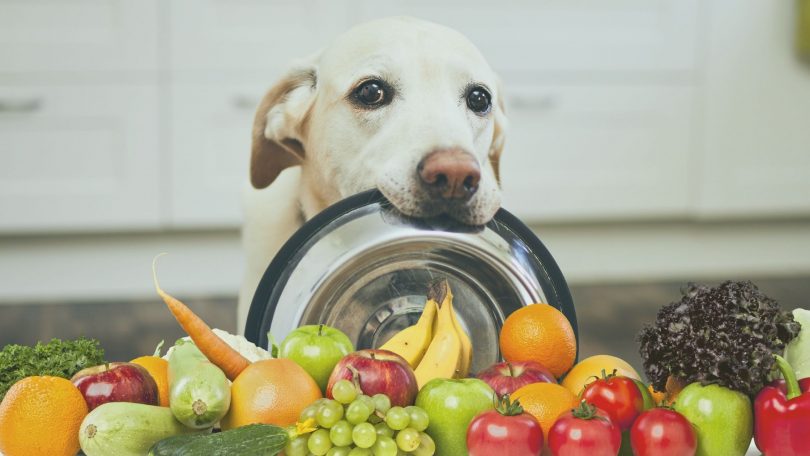Have you ever wondered if there is a better way to feed your dog? Here are some tips and tricks that can help you make homemade natural dog food on the cheap.
Providing your dog with the best possible nutrition is important. If you have an older dog, finding the ideal food can be difficult since your furry friend has probably lost at least some if not all of their teeth. You want a soft food your dog can chew and digest easily, but the options seem endless and the labels can be confusing.
You will see the word natural appearing often which raises even more questions. Understanding exactly what natural means and the differences in terminology will help you choose the right soft dog food for older dogs.
What is natural dog food?
The word natural means the ingredients are available naturally as opposed to manmade or requiring a synthetic or chemical process. There is no definition for natural available from the FDA for pet food labels. There is an FDA requirement that all pet foods must be safe to eat, do not contain any harmful substances, are manufactured in sanitary and clean conditions and are labeled truthfully.
The distribution of dog food is regulated by federal, state and local agencies providing guidelines through the AAFCO. These guidelines include using specific terms on the label including organic and natural. To qualify, all pet foods must include ingredients in their natural state or manufactured with a synthetic process not requiring chemicals or chemically simulated additives.
When you see the word natural on the label, it can describe either the entire product or only certain ingredients. This means the product is not necessarily 100 percent natural.
Different types of dog foods
Understanding the different types of dog food is important since you can determine the quality of the food such as raw dog good or chemically processed dog food bad. Many people confuse the words natural, holistic and organic. To find the best dog food for older small dogs, you need to understand the meaning of each of these words as they pertain to dog food.
Natural dog food
When you see the word natural on the label, the implication is all of the ingredients can be found in nature without any human manufacturing necessary. You need to read the entire label to figure out if all of the ingredients are natural or if only certain ingredients qualify. A good example is the phrase all-natural beef flavor.
Holistic dog foods
The word holistic is intended to encompass the entire being of your dog instead of the individual factors. Unfortunately, holistic does not have much meaning for dog food since it is not regulated under the FDA, USDA or AAFCO. In many instances, holistic is used for marketing purposes only and has nothing to do with the ingredients in the dog food. If you are concerned about digestion for an older dog, you are much better off with natural dog foods.
Organic dog foods
Organic is defined by AAFCO as any pet food meeting the handling and production requirements established by the National Organic Program of the USDA. This program is responsible for the regulation of agricultural products, livestock and crops stated or labeled as organic in addition to being certified according to the standards of the USDA. In order for the label to feature a USDA organic seal, the product must have a minimum of 95 percent organic ingredients.
The best dog food for older small dogs and dogs missing teeth
If you are interested in finding the best soft dog food for older dogs, you need to consider the digestive and chewing capacity of your dog. Just because your dog has lost most of its teeth does not mean they are unable to enjoy or benefit from nutritious foods. Since missing teeth are considered a special dietary need, there are pet food companies offering special dog foods.
You also have the option to prepare your own dog food or hydrate dog kibble. Trial and error may be necessary if your dog is a finicky eater. The idea is to improve the health of your furry friend by feeding them naturally.
Hydrated kibble
One of the fastest and easiest options is hydrating and softening the natural hard kibble you have been feeding your dog. This is beneficial if your dog is a selective eater since they already enjoy the flavor. Simply add a little water or natural broth to the hard kibble, then cover the bowl and allow it to sit overnight to soften. Use a fork in the morning on the softened kibble and make certain any chinks have been broken up.
Since dogs with missing teeth often have a sensitivity to hot and cold, add a little extra liquid to the bowl then place it in your microwave for a few seconds. Make certain the temperature is not too hot before you give it to your dog. You want the food to be lukewarm. The warmth of the food will soothe your dog’s gums, and since the food is familiar, comforting and soft, your dog will not have any difficulty eating.
Canned soft dog foods
If you look at the pet store, you will find a wide range of soft, canned dog foods. If your dog enjoys a specific brand of natural dry kibble, there is most likely natural canned soft dog food available in the same brand. Your dog will be pleased because the flavor is essentially the same and you can relax because you already trust the brand.
This type of food meets the nutritional requirements of your dog on a daily basis. If the food has gravy, there might be chunks of food you should mash before giving it to your dog. This type of food also needs to be warmed gently.
Homemade soft dog food
If you prefer, you can make soft and natural food for your dog at home. Start by adding natural lean protein such as chicken, turkey or beef to your slow cooker. You can also add fruits and vegetables including:
- Berries
- Mango
- Bananas
- Butternut squash
- Bell peppers
- Spinach
- Sweet potato
- Green beans
- Zucchini
All of these ingredients are nutritious and safe for your dog. Cook everything on low in your crockpot for eight hours. Once cooled, you can add grains such as rice. Blend everything together before serving it to your dog. If you do not have a slow cooker cook everything on your stovetop.
Benefits of natural dog foods for older dogs
Regardless of the age of your dog, natural dog foods provide the nutrition your dog needs. Proper nutrition helps to support the health and appearance of your little friend. The benefits include supporting:
- More nourished skin
- Immune system support
- A glossier coat
- Natural weight control
- Higher energy levels
- • Healthy digestion
Common ingredients in natural dog foods
Since you already understand the needs and tastes of your dog, you can choose the foods you know they will enjoy the most. Even if trial and error are necessary, once you see the differences in your dog it is worth your time. The most popular ingredients for natural dog foods include:
- Sources of animal proteins including fish, turkey, duck and lamb
- Starches including potatoes
- Extracts including cranberry and yucca
- Whole grains such as rice and barley
- Herbs including rosemary and chicory
- Seaweed
- Vegetables such as peas, carrots and tomatoes
No two dogs are the same and the foods your dog enjoys the most are different from other dogs. When you first switch to natural dog foods, try to be patient since your dog will need a little time to adapt. To avoid upsetting your dog’s stomach, try making the change gradually. All you need to do is add a little of the new food to the current food. Gradually replace more and more of the original food with the new.
Within about seven days, your dog will be eating complete meals of natural dog food. If you have any specific concerns or your dog has special health needs, it is a good idea to talk to your veterinarian before making any changes.







